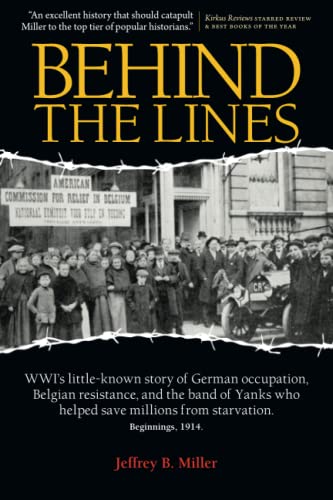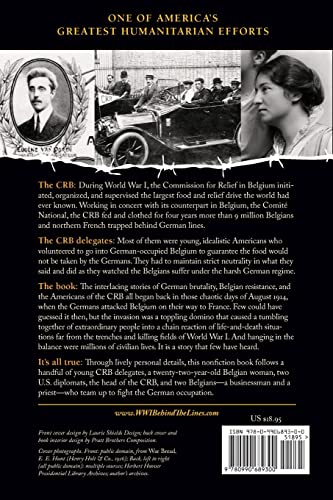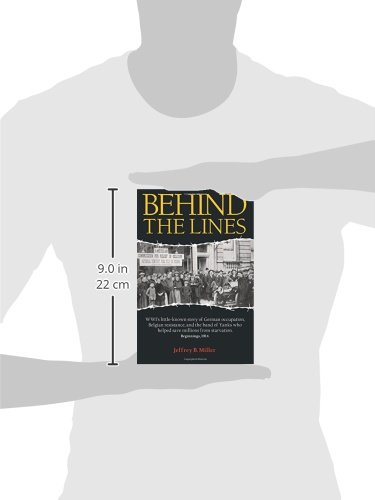



Full description not available
R**N
Historical writing for readers of all backgrounds!
Jefferey Miller's Behind the Lines is a fascinating story about the CRB (Commission for Relief in Belgium) in Belgium during World War I. It's a little known aspect of the Great War, making Miller's story not only entertaining, but informative as well.Unlike many other historical narratives, Behind the Lines is a compelling page-turner, never getting bogged down in historical nitpicking or unnecessary detail. The book is irresistible and keeps you on the edge of your seat throughout. Thanks to Miller's exhaustive research and knowledge about the CRB, Behind the Lines takes readers on a journey that feels timeless (even though a century has passed) and relevant even in today's world.Behind the Lines is a stunning read for history buffs and everyday readers alike. The book will pull on your heartstrings, keep you in suspense and ultimately show the power of humanity, even in the face of great peril. If you are looking for an engaging, informative and well-written book that begs to be read, look no further than Miller's Behind the Lines.
R**R
A compelling read...
Full disclosure first. Jeff is a friend of mine and I was witness to the long, arduous process that resulted in this book. While our friendship is long and enduring, it's never clouded my perspective regarding his writing. Having never been a great fan of "history" books I found this story and narrative to be absolutely compelling. I'm distant enough from the war, as are most of us still alive today, that it doesn't resonate the way perhaps Vietnam or the newly-minted wars in the Middle East. This book, so profoundly researched and so personally driven, gave me a very clear sense of one aspect of WW1 and, by merit of that, a deeper understanding of the scope of this tragedy and it's intimate effect on so many.The blend of historical perspective and personal stories made this book a compelling read. If you have an interest in WW1 and our global history, it's a must. Well-written, beautifully structured and a page-turner.
E**C
Don't miss this read, even if you are not a history buff.
This is one of the great untold American, feel good, stories. It comes during a time when Americans can well use some great things said about us..... A reminder who who we are and who we can be. It talks about the incredible sacrifices and yet no one seems to know about it. I am not a history buff at all, but because of the recommendation of someone else, I decided to read it. The format makes it for such easy reading, more like reading a great novel, and well organized with a flow like reading articles in a magazine,.. than what could be a cumbersome lesson on history. Don't miss it.
D**G
... about the Commission for the Relief of Belgium is wonderful. It's a story every American should read for ...
This historical document about the Commission for the Relief of Belgium is wonderful. It's a story every American should read for two reasons: to learn about our countries' involvement in the feeding of millions of Europeans during the early years of WWI, and to learn about the important development of the American ethic of giving to those in need. It's also a fascinating look at the complexity of establishing a network of food production, procurement and distribution during war, coping with conflicting governments and the realities of available means of travel. I heartily recommend this book, and I look forward to the next two volumes!
A**R
A Great Read!
This is a great book for anyone who enjoys history. It is written in a non-academic way that tells a very interesting period of history. I highly recommend it!
L**S
Great Summary
The author does a great job of summarizing the work of Herbert Hoover and the CRB but I would have enjoyed far more information on the resistance in the occupied lands by the Belgians. I hope the authors follows through with his promise to publish another book covering 1915.
C**S
A captivating story that added to my knowledge and love of history
Well researched and written. A captivating story that added to my knowledge and love of history.
R**N
Four Stars
Very good
M**E
How a humanitarian enterprise saved the lives of 9 million Belgians from starvation during World War One
To those who think World War One was a completely pointless loss of life should read Jeff Miller's book on the brutal treatment of the 95% of Belgium under German military occupation from August 1914. It documents in great detail from contemporary diaries and biographies, the consequences of the German invasion and its impact on 9 million Belgians, who were in weeks on the point of starvation. As a densely populated country which imported 70% of its food ,paid for by exports and a strong manufacturing base , this state of affairs came to an abrupt halt with the collapse of its economy and the blockade of its ports by the Royal Navy.The Germans invaded Belgium in August 1914, in violation of the Treaty of London of 1839, which guaranteed Belgian neutrality by the Great Powers, blaming the French and Belgians. They had a mind set of punishing any perceived resistance or sabotage ruthlessly , which resulted in destroying villages and burning towns, executing 5,500 men , women and children , some as young as three months old in the first six weeks of the War. They then imposed martial law with strict curfews , tight controls on movement and civilian life in general.Miller in great detail plots the rise of the Commission for the Relief of Belgium headed by the outstanding leadership of Herbert Hoover , a mining engineer with his group of American volunteers including some young Rhodes Scholar students from Oxford University who on their own initiative set up a link with the Belgian Comite National , to ensure that thousands of tons of food were transported every month to the starving millions in Belgium and German occupied northern France.Miller shows by a series of brief chapters the progress of the CRB , travelling between London , Holland , Brussels and Antwerp as well a Hoover's fund raising in America. Here is outlined all the twists and turns with an Occupying power which had washed its hands of feeding its conquered population , blaming everything on the British Naval blockade and politicians in London reluctant to see food sent to Belgium which they felt should have been provided by the German authorities. There was also much disagreements between the leaders in Belgium , plus an a ruined infrastructure which made the supplies by barges through the Dutch and Belgian canal system challenging.Miller writes from his own family history , his grandmother being a Belgian, who experienced the Occupation as well as being involved in the Resistance while his grandfather was an American volunteer who came to Belgium as part of the CRB.This is the first of a three volume project , book two goes onto 1915.It is a well researched and scholarly piece of work of over 400 pages, which does not make it a quick read.My own interest in this subject is also tied up with family history as my maternal grandparents in 1914, lived less than 10 miles from the Bunce family , Miller's grandmother . They both experienced the impact of invasion and the siege of Antwerp which was shelled for days by heavy German artillery. My grandmother told me about the German atrocities and how they at times starved during the Occupation when conditions were so bad , that they had to eat rats!Herbert Hoover is rightly praised for his humanitarian work in this period , he later went onto help feed 20 million Russians during their Civil War and became President of the USA in 1929. He then became a scapegoat for the effects of the Great Depression of the 1930s with a tarnished reputation. However later he led national commissions of American governance under Presidents Trueman and Eisenhower.
D**H
Excellently written and well-researched
This is an excellently written and well-researched history of an enterprise - feeding the starving Belgian population - that is far too little known. My only quibble is that it only covers up to the end of 1914/Jan 1915, but there are more books to come by this talented author, covering the rest of the war, books which I'm eagerly looking forward to reading! With his unique personal history, Miller is in the ideal position to bring the story vividly to life, which he accomplishes with great style.
M**S
It was not only the Red Cross that fed thousands
Excellent book, which tells the story(TRUE) of how thousands of Belgium's were saved from starvation in 1914 thanks to a group of volunteers. This is the first of a series of three books, and I look forward to their publication with anticipation.
R**D
Oude Gracht Hoogboom
Prachtig geschreven verhaal dat zich grotendeels afspeelt rond een prachtig domein, Oude Gracht in Hoogboom. Te meer daar de familie van de auteur daar destijds zelf woonde.
Trustpilot
1 week ago
5 days ago